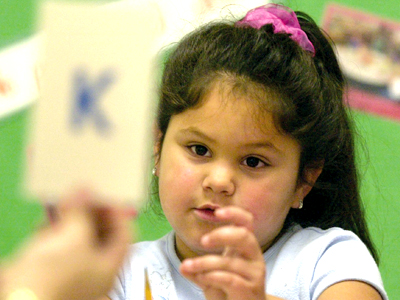
As immigration enforcement ramps up, so rises the fear of undocumented parents about the fate of their children if they are separated by deportation and returned to their native country.
Will the children stay in the United States? Who will care for them? Will someone transport the children to the parents wherever they are? Will U.S. authorities place them in foster care? And if so, will the parents be able to reclaim custody?
There are about 6 million U.S. citizen children with at least one parent who is in the country illegally. In California, nearly 2 million citizen children live with an unauthorized family member, according to a recent study by the Center for American Progress and the University of Southern California Center for the Study of Immigrant Integration.
Deportation wreaks havoc on such families. Sudden displacement can leave one or both parents in another country—desperate to reunite with their youngsters or trying to make plans for their care from afar. Federal authorities do not transport anyone other than the deportee, so it’s up to the immigrant or the family to make arrangements to reunite later. Deportation can also mean the loss of a breadwinner, possibly forcing the remaining family members into deep poverty or even homelessness.
For a child, there are several possible outcomes of parental deportation. They may be reunited with their parents in the home country; they may be left with family or friends; or—if they are home alone, no one picks them up from school, or care from friends of family family fails—they could end up in foster care.
“Millions of families had to face that circumstance under President Obama, but we were under the impression that some people were safe and that there could be a future beyond deportations of the ‘bad ones,’ said Jorge-Mario Cabrera of the Coalition for Humane Immigrant Rights in Los Angeles.
In the first half of 2016, federal authorities deported nearly 15,000 people who said they were the parent of a U.S. citizen child, according to a report presented to Congress. The previous year, the Department of Homeland Security reported removing more than 30,000 such parents.
But recent studies by the Migration Policy Institute and the Urban Institute estimate that the number of parents of citizen children deported each year is closer to 100,000. Most were fathers, and generally their children stayed in the United States with their mothers, or with relatives or friends.
“Kids should not be bearing the brunt of what is happening with their parents,” said Heather Koball, a co-author of the studies and now director of family economic security for the National Center for Children in Poverty at Columbia University.
Some who back more aggressive immigration enforcement say children should not be a consideration in deportation decisions.
“However much people might empathize with the situation of the children of illegal immigrants, we must remember that the responsibility for their circumstances rests with the parents who knowingly violated the nation’s immigration laws and put their children in this difficult situation in the first place,” said Dave Ray, spokesman for the Federation for American Immigration Reform, which supports increased enforcement.
Since 2013, the federal Immigration and Customs Enforcement agency (ICE) has been taking a parenting or caregiver role into consideration when arresting someone. This is part of a directive known as “parental interests,” which also allows for a parent to call for childcare if a child is going to be left alone. The directive is still active, according to ICE.
On a recent Saturday morning in Los Angeles, Noe Perez, 32, arrived at the Coalition for Humane Immigrant Rights before 5 a.m. to get one of 20 coveted one-on-one legal consultation slots. The line behind him snaked down the block.
He’s been in the United States since he was 5 years old. Now he has a daughter that age. Perez is hoping to qualify for a visa for victims of crimes. Like many others he is exploring any legal standing he might have to stay.
“I will not leave her here,” he said of his daughter. “Why leave her in a country that is going to treat us so differently. When I came here, I didn’t know what was going on. My parents thought they were doing the right thing.”
What Perez means is he would not leave his child in the U.S. to live indefinitely. If deported, and once in his native country, he would have to arrange for her to be reunited with him as ICE does not transport anyone except deportees.

